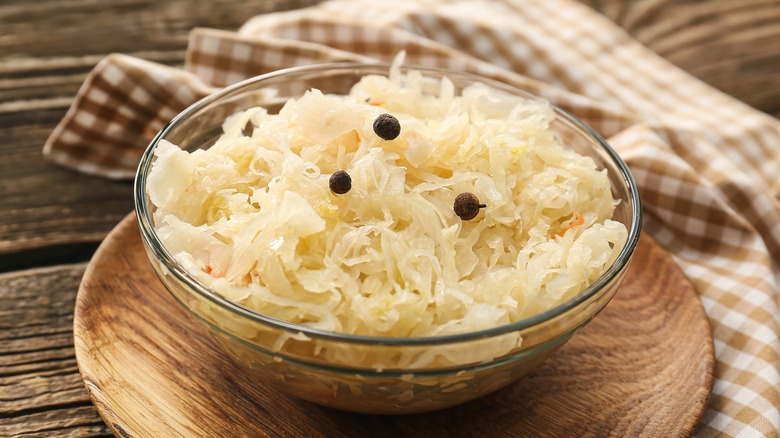Why People In The US Once Called Sauerkraut 'Liberty Cabbage'
When Germans immigrated to the United States, they brought with them their affinity for beer, schnitzel, strudel, sausages, and sauerkraut. It's the last item that Americans had some issues with over 100 years ago. Although not unique to German food, according to GermanFoods.org, sauerkraut plays a big part in the country's cuisine as a topping and can be found as the main component in some recipes. The name sauerkraut comes from the German words sauer (meaning sour) and kraut, meaning cabbage.
To make traditional sauerkraut, cabbage is fermented with the use of salt and its own juices. The fermentation process provides some health benefits, according to Healthline, such as the creation of probiotics, which helps gut health by making foods easier to digest. Probiotics also help with the absorption of vitamins and minerals found in foods. Some of the vitamins and minerals that sauerkraut contains are vitamins C and K1, iron, manganese, vitamin B6, folate, copper, and potassium, per Healthline. With all of its health benefits and the relatively simple process to make, it's no wonder that sauerkraut became popular in the United States.
A temporary name change
According to Germanfoods.org, although sauerkraut's origins likely go back to ancient China, the fermented cabbage dish is most commonly associated with Germany. This resulted in the food getting a temporary name change. During World War I, when the United States fought alongside its allies against Germany (April 1917 to November 1918), sauerkraut was referred to as "liberty cabbage" (via Oxford Reference). During this time, things of Germanic origin were often viewed as unpatriotic.
In particular, areas with larger German populations the anti-German sentiment was strongest, resulting in the language no longer taught, city names being changed, and German language newspapers going out of business, per the University of Houston's Digital History. Anti-German sentiment even escalated to where the U.S. government enacted espionage and sedition laws, reports the Medium.
An Associated Press article printed in The New York Times on April 25, 1918, tells of how growers wanted sauerkraut to be renamed because they said the "pro-German stigma" of sauerkraut resulted in a significant drop in consumption of the dish. Sauerkraut wasn't the only food to undergo a temporary name change. Others included "Liberty Steak" for hamburgers and "Liberty Sausage" for frankfurters, per Medium. The word "liberty" was chosen because it was viewed as a representation of America with its freedoms, per Oxford Reference.
After the war, liberty cabbage went back to being known as sauerkraut, which again was scooped liberally onto bratwursts and hot dogs for all to enjoy.

